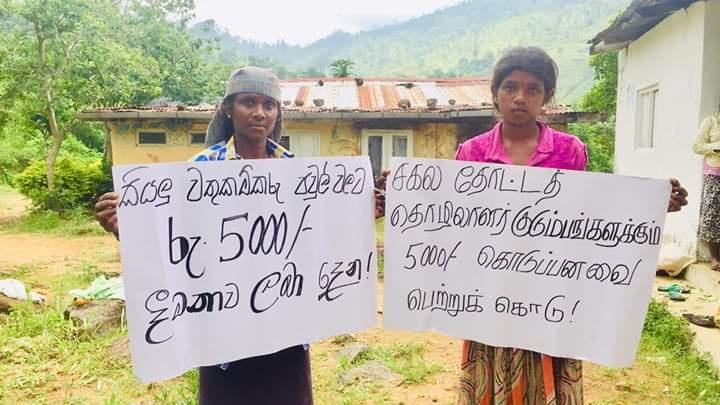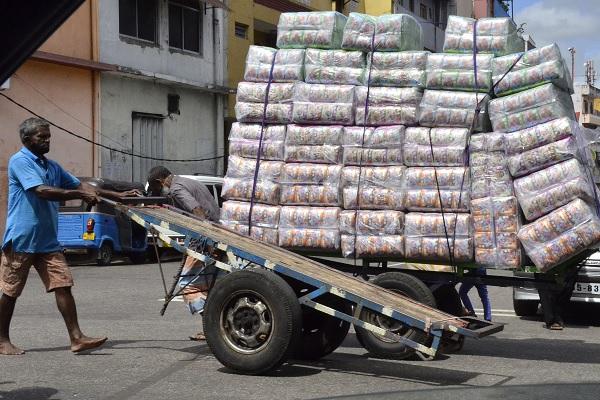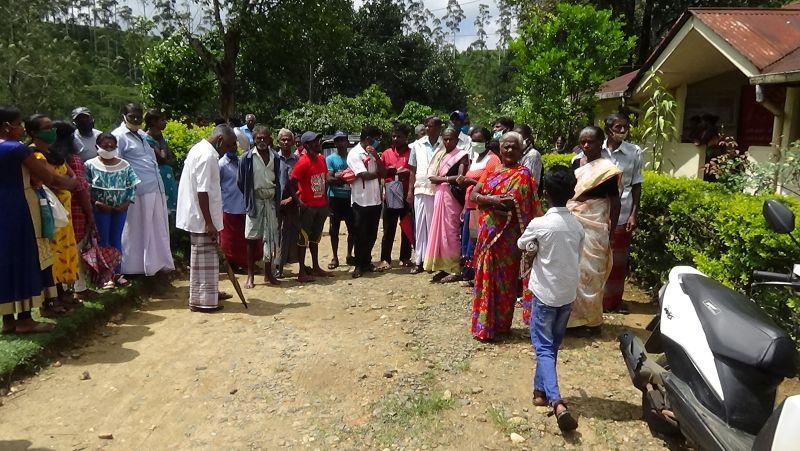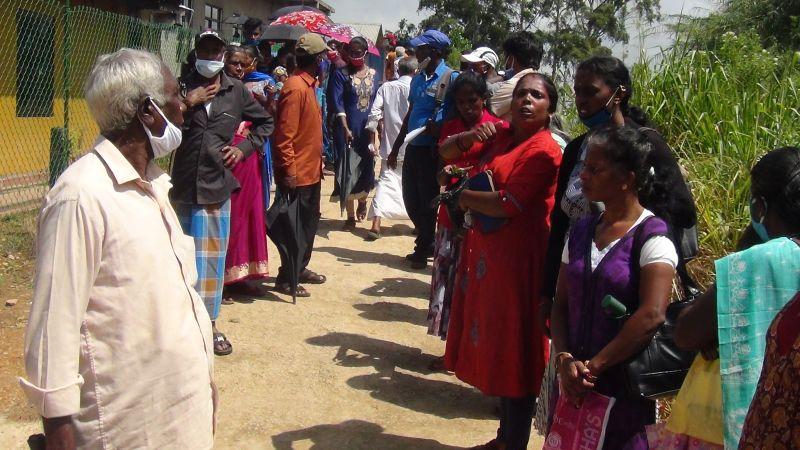23 Jun 2020 - {{hitsCtrl.values.hits}}

By Piyumi Fonseka
COVID-19 is a crisis like no other the world has faced in recent decades, in terms of its economic impacts. The World Bank estimates that the pandemic could push about 49 million people into extreme poverty in 2020. It says that a large share of the new poor will be concentrated in countries that are already struggling with high poverty rates, but middle-income countries will also be significantly affected.
The World Bank says that Sri Lanka is ranked as the poorest performing economy in South Asia with its economy registering only a 2.7% GDP growth last year. Now being confronted with the COVID-19 the situation will further worsen.

The consequences of the COVID-19 outbreak have put a spotlight on economic inequalities in the country. Usually, vulnerable communities are left to bear the economic brunt of any crisis. The COVID-19 pandemic have affected households in many ways, including job loss, loss of remittances, higher prices and rationing of food and other basic goods.
With the purpose of providing some relief for the badly affected households in Sri Lanka, the government launched a programme to distribute a monthly allowance of Rs. 5000 for a selected group of families. Accordingly, around 7.4 million people affected by the pandemic were selected by respective local government authorities for the relief allowance programme. The government had allocated more than Rs. 50 billion to pay the allowance for the months of April and May. The selected 7.4 million people included 629,214 elderly persons, 123,641 persons with disabilities and 44,291 kidney patients.
However, trade unions allege that many people who had lost their livelihoods due to the pandemic and travel restrictions have not been beneficiaries of the government allowance programme.
Speaking to the Daily Mirror, President of the United Self Employed Workers’ Union Charles Pradeep said that there are around 50, 000 self-employed workers in Pettah alone and they have not received the Rs. 5000 allowance. A handful of the workers who have received their April allowances in May, are still waiting for their May allowances, Pradeep claimed.
The issues with distribution of Rs. 5000 allowance were reported from various areas in the country. Estate workers in Hatton and Watawala have been going to their local government institutions for more than two weeks to get the Rs. 5000 allowance of May. They have been informed that the authorities were yet to receive funds from the government to distribute among beneficiaries.


Estate workers in Hatton and Watawala standing in queues for weeks to get the Rs. 5000 allowance of May. Photos by Ranjith Rajapakshe
Meanwhile, an incident where a Grama Niladari officer allegedly stole the funds allocated for the 5000 allowance, was reported from Matara. The Grama Niladari officer of East Kithalagama, Matara was nabbed for allegedly stealing from the Rs. 5000 allowance which were allocated by the government for low-income households. An inquiry has been launched against the female officer over the fraud of more than Rs.100, 000 from the government funds.
According to the Matara District Secretary Pradeep Ratnayake, the female Grama Niladhari officer of East Kithalagama had allegedly forged signatures of persons from low-income families in her area and helped herself to funds which were allocated for distribution. The officer has been transferred to the Thihagoda Divisional Secretariat Office pending an inquiry. District Secretary Ratnayake told the Daily Mirror that strict disciplinary action would be taken against her based on the findings.
The aggrieved villagers in Kithalagama, Matara are still waiting for the 5000 allowances for May. When the Colombo rich families spend more than Rs. 5000 just for a dinner per person, hundreds of families in Matara and across the country are still waiting for an envelope of Rs. 5000. The families claim that since they still have not been able to resume their jobs and shops, the allowance plays an important role in meeting basic needs.
Among the group of aggrieved villagers in Kithalagama, 75-years-old Godage Gunadasa said, “My wife has a mental disorder. On May 14, when I went to get my monthly Old Age Allowance, our Grama Niladari madam asked me to place my signature in several documents. I obeyed her. But, I didn’t get my Old Age Allowance that day. Therefore, I checked about it with the Provincial Secretariat’s Office. That is where I learnt that Rs. 10, 000 of my relief allowance and Rs. 5000 of my Old Age Allowance had already been settled using the documents where I was asked to sign by our grama niladari madam.”
On the following day, the Grama Niladari officer had paid a visit to Gunadasa’s house to settle the outstanding money. She had demanded Gunadasa not to jeopardize her profession and to just accept the money. A day later, Gunadasa had received a threatening call from her for reporting about her to the Provincial Secretariat’s Office. Gunadasa then decided to lodge a complaint with the police. As a result of the police complaint, preliminary investigations revealed that Gunadasa was not the only victim in his village.
Thirty-five-year-old V. Harsha said that her ill mother had also been hoodwinked by the Grama Niladari officer in the same way and stolen Rs. 10,000 worth of allowances. After Gunadasa’s complaint, the Grama Niladari officer had settled the due payment with Harsha’s mother as well. Jayani Chamali’s 71 years old mother has also been a victim. When Jayani posted about her mother’s experience on her Facebook, the Grama Niladari officer has threatened them too.
Following media reports on irregularities in the distribution of the Rs. 5,000 allowance, the Auditor General’s Department launched an investigation. W.P.C. Wickramaratne, the Auditor General said the investigation had been launched, based on complaints received and the issues in the allowance scheme. The Auditor General noted, “The general public can continue to lodge any complaints regarding the Rs. 5,000 allowance.”
The investigation is being conducted under the supervision of a Deputy Auditor General and across the island on district and regional level. In the meantime, the Centre for Monitoring Election Violence in a letter addressed to the National Election Commission’s Chairman Mahinda Deshapriya on the 17th of April 2020, also leveled allegations against the Rs. 5,000 allowance scheme.
The letter titled “Use of official voter registration lists without Election Commission approval,” stated, the Director-General of Department of Samurdhi Development had issued a circular on April 1, with a letter dated April 12, 2020, “…to all District Secretariats requesting them to hand over the 2019 Voter registration lists to Samurdhi Bank Societies and Samurdhi Community Base Bank for the purposes of identifying beneficiaries and preventing the potential double-counting of beneficiaries.”
“Reports and information we received so far confirm that Samurdhi rural banks and Samurdhi officials are using these Voter registration lists in many areas of the country for purposes other than the social relief programmes,” noted the CMEV, in its letter.
Stealing from anyone is wrong, no matter if it is the vulnerable or the able who are affected. Knowingly taking away the last piece of bread from a deprived, hungry man is a sin. It is not less of a crime than stealing from someone with fat pockets, but something about the act in itself is immoral. The worst scenario is when such acts are being carried out by people who have been appointed to take care of the poor.
(Additional Contribution: Krishan Jeewaka Jayaruk)
04 Jan 2025 2 hours ago
04 Jan 2025 3 hours ago
04 Jan 2025 4 hours ago
04 Jan 2025 4 hours ago
04 Jan 2025 4 hours ago